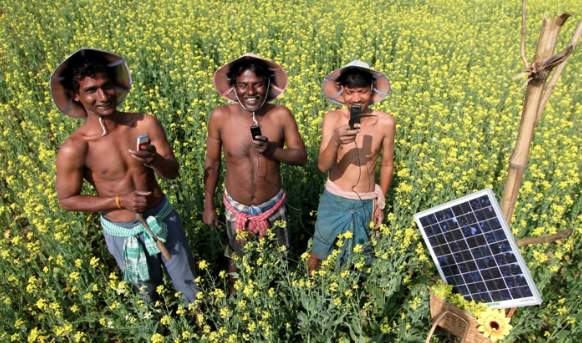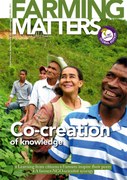Knowledge building is central to agroecology rooted in family farming. But why? What type of knowledge, and whose knowledge is mobilised? This issue of Farming Matters explores what we really mean by co-creation of knowledge in agroecology, why it is so essential for today’s challenges, and how it takes place around the world.

In agroecology, farmers continuously build situation-specific knowledge that allows them to develop under unpredictable and changing circumstances. There are no fixed prescriptions in agroecology about how to produce, process, market or store food, feed, medicine and fibre. Rather, different practices work in different ways depending on each specific context and ecosystem. This is why agroecology is knowledge-intensive and why the combination of different types of knowledge is so essential in agroecology.
Knowledge co-creation is especially relevant and urgent in the context of climate change. Developing climate resilient agriculture is all about building knowledge related to locally rooted adaptation strategies. Farmers’ knowledge of seeds, land, water and other local resources is absolutely central in this process.
Solutions to problems or ways of improving production emerge through experimentation, practice and learning with others, especially because different types of actors generate different types of knowledge. Bringing people with various perspectives, experiences and questions together can facilitate creativity and innovation. Co-creation of knowledge happens when such new knowledge emerges from sharing, learning and working together with other people.
The various contributions in this issue take a look at the following questions: what kind of knowledge are we creating in agroecology? How can learning and sharing turn into co-creation of knowledge? How can farmers become equal players in co-creation of knowledge with scientists, policy makers and others? How is co-creation relevant for the agroecological movement?
What knowledge and whose knowledge?
In agroecology, knowledge about the way the farming system works as a whole is important. Often, innovation requires knowledge about the relationships among elements of the agroecosystem, for example insects, pests and companion plants (see this article). Or -in the social world- between farmers’ preferences and diverse varieties of crops (see this article).
Questions and uncertainties are also a highly relevant form of knowledge; knowing what we do not know can shape further inquiry and courses of action. Both in the experiences from Mexico and from India people came together and organised around a quest for knowledge. This is also evident from this article which points at our lack of knowledge about effective policies that work for agro-biodiversity.
And in order to act, we need knowledge about how (through what methods and procedures and skills) a desirable outcome such as higher yields, healthier soils or better nutrition may be achieved. Last but not least, co-creation may involve knowledge about people involved in the process. This is relevant because innovation often requires alignment between people who depend on each other to get something done.
While scientific knowledge aims to be largely explicit, a lot of relevant knowledge and skill in agriculture is tacit, implicit or hidden in (women) farmers’ practices and in their heads. Bringing it to the table may require deliberate exploration, elicitation and discovery. Experiences in Rwanda and the Netherlands indicate that in these processes, it is necessary to first establish trust among different actors.
Furthermore, as this article points out, questions about whose knowledge ‘counts’, and why this matters are fundamental ones – but rarely addressed, As a result, practical knowledge held by food producers is often grossly unrecognised. This may especially be the case for women’s knowledge, even though they make up 70% of the farmer population worldwide.
Beyond individual learning
“The diverse knowledge and ways of knowing of our peoples are fundamental to agroecology. We develop our ways of knowing through dialogue among them”
– Declaration of the Nyéléni Forum on Agroecology, 2015

What distinguishes co-creation of knowledge from individual learning is the collective generation of new knowledge. Agroecology blends different types of knowledge: traditional, indigenous knowledge, farmers’ knowledge, and scientific knowledge, to name a few. Each of these types of knowledge holds different treasures. Indigenous practices often hold clues about innovative ways of doing things, based on years and years of experience, such as how to manage pests using local, available resources. Farmers’ knowledge can contribute context-specific insights about a particular type of seed, planting dates, or soil resource. Scientific knowledge can inform us about processes and phenomena that are more difficult to see and comprehend with the naked eye. Bringing together these types of knowledge has led to ground-breaking insights in the eld of agriculture. The partnership experience of farmer Jim Cochran and academic Steve Gliessman is a good example of this.
As described eloquently by Elizabeth Mpofu, co-creation of knowledge occurs regularly in day-to-day life as people ask and discuss questions in an attempt to resolve problems, and as they jointly put solutions into practice. From such a process, and this often happens in agroecology, innovations can emerge that are not only technical but that are also social or political in nature. Innovation often emerges over time and requires repeated meetings and sharing. As an experience in Honduras indicates, a long lasting commitment between the actors is therefore fundamental for these processes.
Co-creation between practice and science
A very specific and important, but delicate type of knowledge co-creation happens between farmers and scientists, as many of the articles in this issue demonstrate. This has a long history. When co-creation of agricultural knowledge is mentioned today, the first kind of co-creation that most people think of is that between scientists and farmers. Already in the 1940s, British soil scientist Sir Albert Howard wrote his famous book ‘An Agricultural Testament’, in which he beautifully describes different systems of compost-making as practiced by Indian farmers. A plethora of participatory methods have been developed since then and nearly 50 years of agricultural research ensued that involved farmers in one way or another.
While many of these processes remained top-down, and farmers were only nominally consulted or involved as ‘beneficiaries’, more radical thinking and practice emerged in which farmers were seen as researchers in their own right. These notions were at the roots of the birth of ILEIA and its magazine in 1984. This kind of thinking manifested itself in, for example, the Farmer to Farmer methodology which originated in Central America, and many other initiatives which together formed the basis for the agroecology movement. At the heart of many such approaches is Paulo Freire’s adagio that poor and exploited people can and should be enabled to analyse and change their own reality.
And this work continues to evolve. This issue of Farming Matters moves away from the lab-to-land mentality in knowledge sharing and looks at existing practices and processes in which farmers truly engage in processes of co-creation. The stories presented on these pages indicate that farmers can be central players in co-creation of knowledge. Although it is still not the norm, there are cases where farmers have a role in setting the research agenda, carrying out the research and analysing the results.
As top-down processes are increasingly met with bottom-up resistance, perhaps one of the most remarkable changes that can be noted over the last decade of participatory research is the co-creation of a new attitude towards the role of farmers in co-creation processes, from both the farmers and the scientists, as Victor M. Toledo points out in this interview.
Creating knowledge in the movement

Agroecological movements are growing stronger around the world. Much of this movement building evolves around knowledge sharing about identity, history, territory, culture and strategy, leading to collective advocacy and organisation as well as other types of political use of knowledge in interactions with others. The Nyéléni processes that bring together various actors around food sovereignty and agroecology are testimony to the strength that can be generated by knowledge co-creation processes.
Another example can be seen in India, where communities are building resilience to climate change through an innovative assessment of the impacts of and responses to climate change in their region. This has given them strength to stand up against the externally imposed REDD (the UN programme for Reducing Emissions from Deforestation and Forest Degradation). Three authors from Coventry University argue that fundamentally rethinking and reshaping the co-creation of knowledge can advance the struggles of social movements who are striving for agroecology and food sovereignty.
This issue of Farming Matters offers a rich palette of practices of knowledge co-creation in agroecology. Around the world, people are generating insight into some of the key factors that can strengthen co-creation processes. As agroecology is gaining momentum as a practice, a science and a movement, further exploration of these factors is necessary. The crucial next step will be to embed these insights firmly in fundamentally new types of practice, policy and research for healthy food systems based on farmer-led agroecology.
Jessica Milgroom and Janneke Bruil work at ILEIA, the Centre for Learning on Sustainable Agriculture and the publisher of Farming Matters
Cees Leeuwis (cees.leeuwis@wur.nl) is a Professor of Knowledge, Technology and Innovation at Wageningen University in The Netherlands.

